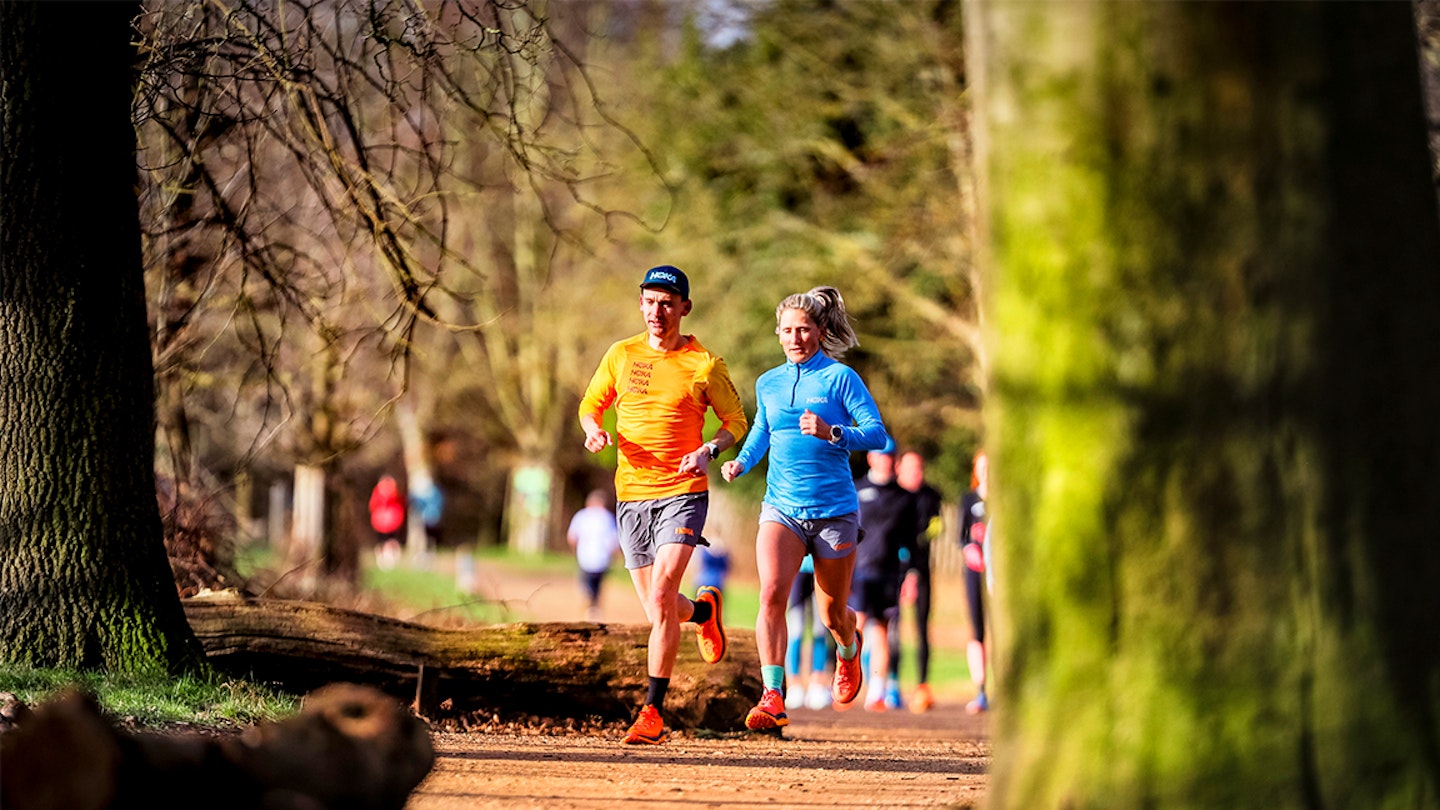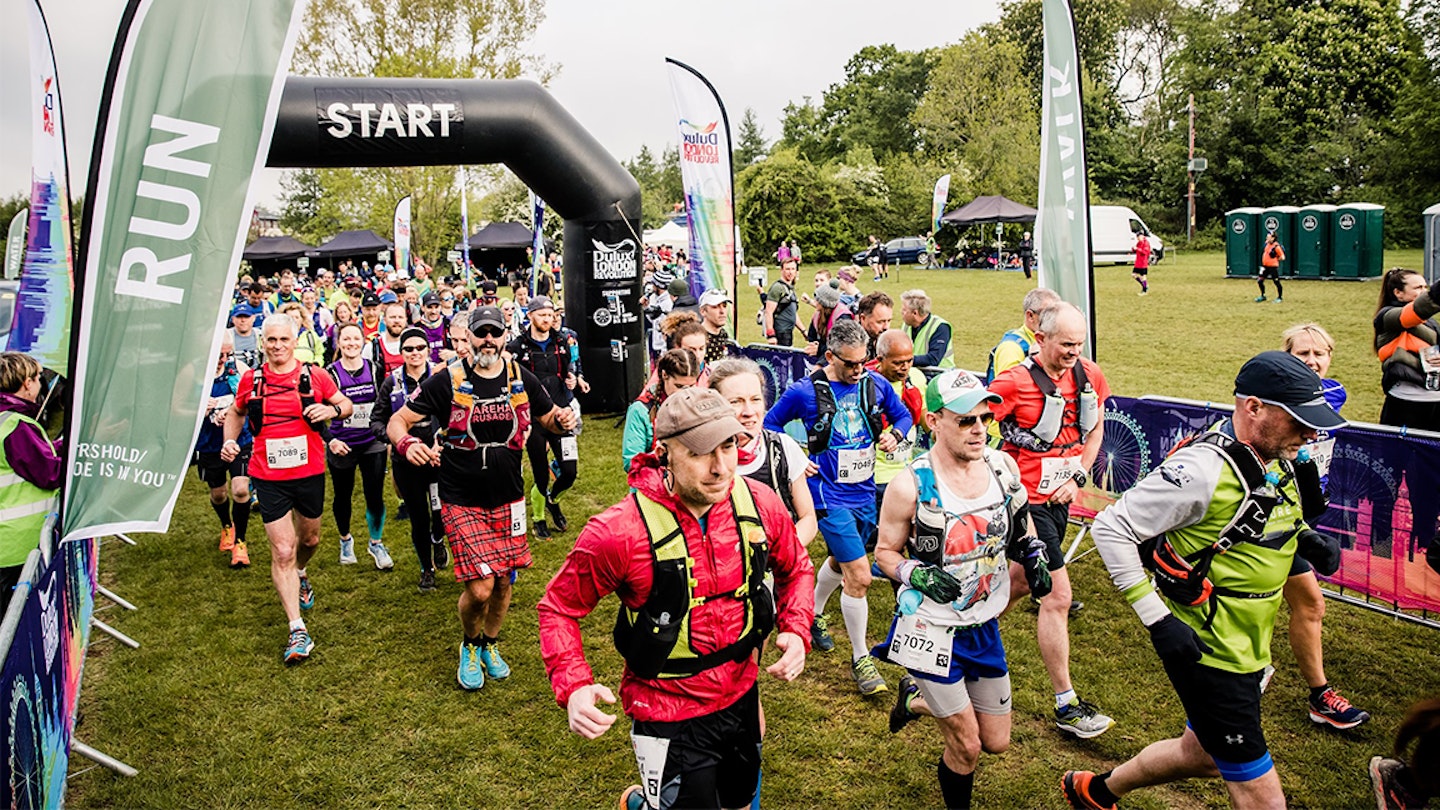For most runners, being able to run your first 5km race without stopping is the first benchmark on our running journey. For many, it’s the start of a new-found love of being more active and exploring the great outdoors.
Most cities in the UK run a free five-kilometre event every Saturday called parkrun. Targeting your local parkrun is a great goal for both the couch-to-5km runner and seasoned athlete alike.
Taking part in these regular organised events will improve your consistency and motivation, and provides the opportunity for you to meet other like-minded runners. In you don’t live in the UK or near a parkrun, consider setting up a regular 5km loop with your running friends or those in the local community.
How do you run 5km as a beginner?

You might already be fit enough right now to tackle the 5km distance and just want to feel strong doing so, or you might be a complete beginner. That’s okay. We all have to start somewhere, and starting is as simple as taking the first step out your front door.
This plan will take you from being able to run 10 minutes non-stop, to completing your very first 5km race. If you can’t run for 10 minutes yet, don’t worry. Set yourself the goal to complete 10 minutes of run/walk intervals a few minutes a week. Start off with one-minute run intervals and gradually increase the run time while decreasing the rest time, until you can manage 10 minutes without stopping.
From here, bookmark three days a week for the next six weeks so you can dedicate yourself fully to achieving your first 5km race. Your training week during this 5km training plan will look something like this: one easy run, as slow as you like; one run a little quicker and perhaps a little shorter; and finally, one run a little longer to help you build up your mileage. Consistency is key here and trust us, it’ll pay dividends.
Don’t forget to prepare by eating a healthy, balanced, and varied diet. If following this plan means you’ll be upping your weekly exercise, make sure you’re consuming enough energy-rich foods to fuel your training.
How long does it take to run 5km?
How fast a beginner should run 5km varies, but a good time goal for completing your first 5km is under 40 minutes, or just under 8min/km. Seeing as a walking pace will have you complete 5km in an hour, how much quicker you can complete the distance when running will depend on your speed.
When we say 5km times vary enormously, we mean it. The world record for 5km was set by Joshua Cheptegei with 12 minutes 35 seconds in 2020. It’s all relative in running. Set yourself a realistic time goal based on your personal abilities and running ambitions, then follow this six-week plan to make them a reality.
How many calories can you burn on a 5km run?

We’ve all got different reasons for wanting to run a 5km race. Some will see it as a challenge or a way to get outdoors, while others may use it as a tool in a wider fitness plan. Either way, we all want to know just how many calories you can burn running 5km.
The good news is that as a cardiovascular sport, running does burn a higher number of calories per minute than many other lower-intensity activities. That means running is a pretty time-efficient way of staying fit. It’s low maintenance too, just slip on a pair of your best trail running shoes and hit the trails.
There’s no set answer for how many calories you can burn running as this will differ from person to person. Calories burnt will depend on many factors including weight, fitness levels, gender, and heart rate. Taking this all into account, most people can expect to burn between 200 and 700 calories on a 5km run.
5km training plan: 6-week schedule

Pace plays a significant role in this schedule. Of course, that immediately poses the question: what should that pace be? The paces in this plan will run from easy, to steady, to hard efforts. This will be based on feel, so if you can chat comfortably and run at the same time, you’ve got easy pace sorted.
Don’t feel like you’re cheating yourself if that sounds too slow or too easy. The greatest runners on the planet do exactly that pace for 80% of their week. A steady pace is one you can maintain for a significant amount of time, but you won’t be able to manage more than monosyllabic chat. Lastly, a hard effort should feel like you’re pushing yourself as much as possible for the distance. Strictly no talking allowed. Enough of the chat, let’s get into it…
Week one
Monday: Run 1.5km at an easy pace
Tuesday: Rest
Wednesday: Run 3km at a steady pace
Thursday: Rest
Friday: Rest or strength work
Saturday: Run 3km at an easy pace
Sunday: Rest
Week two
Monday: Run 1.5km at an easy pace
Tuesday: Rest
Wednesday: Run 1.5km at a hard pace with 10 minutes of stretching - repeat twice.
Thursday: Rest
Friday: Rest or strength work
Saturday: Run 3km at a steady pace
Sunday: Rest
Week three
Monday: Run 3km at an easy pace
Tuesday: Rest
Wednesday: Run 800m at a hard pace with five-minutes of stretching - four sets.
Thursday: Rest
Friday: Rest or strength work
Saturday: Run 4km at a steady pace
Sunday: Rest
Week four
Monday: Run 5km at an easy pace
Tuesday: Rest
Wednesday: Run 1.5km at a hard pace,10min stretch. Repeat x 3
Thursday: Rest
Friday: Rest or strength work
Saturday: Run 5km at a hard pace
Sunday: Rest
Week five
Monday: Run 5km at an easy pace
Tuesday: Rest
Wednesday: Run 800m at a hard pace, 5min stretch. Repeat x 5
Thursday: Rest
Friday: Rest or strength work
Saturday: Run 6.5km at a steady pace
Sunday: Rest
Week six
Monday: Run 3km at an easy pace
Tuesday: Rest
Wednesday: Run 800m at a hard pace, 5min stretch. Repeat x 5
Thursday: Rest
Friday: Rest or strength work
Saturday: 5km race day!
Sunday: Rest
